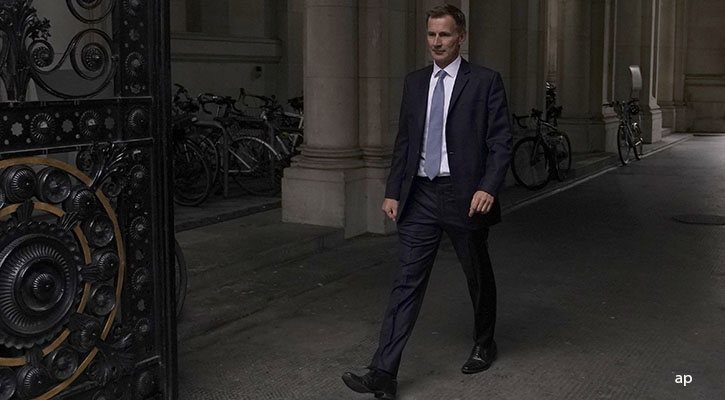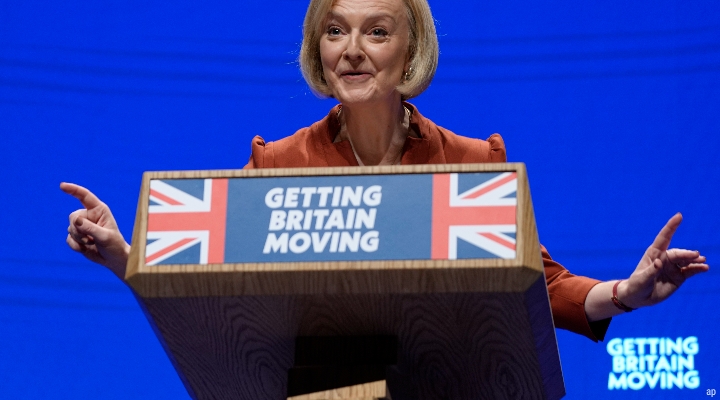
New chancellor of the exchequer Jeremy Hunt has ripped up the government's mini-Budget policies, announcing an extraordinary U-turn on plans to lower tax. The planned cut in income tax next year to 19p in the pound has now been ditched, and the energy bill support package will now end in April 2023.
This means that, including Friday's reversal of the planned corporation tax rate and the hasty U-turn on the 45p tax rate, three key pillars of the September 23 mini-Budget have now been demolished. Only the changes to National Insurance and the stamp duty cut remain in place since that day.
The government will now also conduct a Treasury-led review of the household energy support package, after Hunt said his department could no longer be hamstrung by the volatility in global energy prices. The original package, known as the Energy Price Guarantee will now end in April 2023, rather than lasting two years from October 2022.
In a softly spoken and solemn televised address, Hunt reiterated the UK government's commitment to fiscal stability, after a three-week period of havoc in the bond and mortgage markets.
"A central responsibility for any government is to do what's necessary for economic stability," he said. "No government can control markets, but every government can give certainty about the sustainability of public finances."
Alongside the measures, Hunt also said several other policies were getting the chop, including cuts to dividend tax rates, and more will be revealed on October 31.
Kwarteng's Tax Cuts Dismantled:
The basic rate of income tax was due to drop to 19% in the next tax year - REVERSED
Corporation tax was set to be cut to 19% in the next tax year - REVERSED
45p tax rate abolished from next tax year - REVERSED
5pm Update: No Word on Triple Lock
The chancellor updated the House of Commons in the late afternoon after Penny Morduant stepped in for the prime minister to answer MPs' urgent questions.
Changes announced earlier in the day were reiterated by Hunt, including the U-turn on the 19p tax rate and foreshortening of the Energy Price Guarantee. On energy bills, he said that the government is looking at a "new approach that will cost taxpayers significantly less".
He reiterated that "difficult decisions" still needed to be made on the nation's finances, and more will be revealed on the October 31 second mini-Budget, which this time will be accompanied by the Office for Budget Responsibility. He praised the expertise and independence of the OBR and Bank of England in his Commons speech.
One new announcement was that an economic advisory council will be created to give the government independent advice. They include JP Morgan's chief market strategist Karen Ward, former Bank of England MPC member Gertjan Vlieghe, Sushil Wadhwani of Wadhwani Asset Management and Rupert Harrison, former chief of staff to the chancellor of the exchequer.
Hunt was asked by opposition MPs about the lifting of the cap on bankers' bonuses, a remaining pillar of the Kwarteng raft of policies, as well as extending windfall taxes.
He was also asked whether the state pension triple lock would continue, to which he responded he would not confirm the status of individual policies.
So far the desired intention of Hunt's message appears to have been achieved. The pound is up against the US dollar today, from $1.12 to $1.14, the UK-focused FTSE 250 closed up more than 2.5%.
Government bond yields continued to weaken after todat's announcements, with the 10-year gilt now just below 4% and the 30-year gilt trading at 4.36%, down from 4.76% in the last market session.
The 10-year gilt had breached the 5% mark at the peak of the market turmoil.
More Difficult Decisions
Prime Minister Liz Truss has made the extensive support package a central part of her pitch to the country, and has used it repeatedly to argue that her Labour opponents didn't have a long-term plan to deal with the fallout from the Ukraine War and spiking gas prices.
"The objective is to design a new approach that will cost the taxpayer significantly less while supporting those most in need," Hunt said.
"There will be more difficult decisions I'm afraid, both on tax and spending. All [government] departments will need to redouble their efforts to find savings. Our priority [...] will always be the most vulnerable."
Hunt ended the sat-down address by saying "the United Kingdom will always pay its way."







.jpg)




















